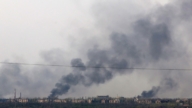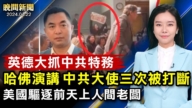【新唐人2014年12月12日訊】12月10號是世界人權日,在北京的上萬名訪民,分別前往聯合國使館區及信訪局伸冤要人權,反而遭到中共警方大規模抓捕關押。而在當天,一岸之隔的台灣,總統馬英九出席世界人權日活動時表示,台灣曾發生侵犯人權事件政府無從迴避,必須徹底檢討。
1948年12月10號,聯合國大會通過了《世界人權宣言》,並把每年的這一天定為國際人權日。中共自1991年以來,也先後發表了11份《中國人權白皮書》,並宣稱中國在人權發展方面取得了進展。
今年人權日的口號是「人權365」,意為天天都是人權日。
10號,中共外交部發言人在記者會聲稱,中共高度重視促進和保護人權,始終將保障13多億人民的生存權和發展權放在首位,人民享有的各項人權水平不斷提升。不過,中共官方媒體當天並未發出有關人權日的相關報導。
那麼中國的人權狀況到底怎麼樣?讓我們看看國際人權日,訪民們在中國首都北京的情況。
10號一大早,在北京的上萬名訪民,陸續湧向位於亮馬橋的聯合國使館區及信訪部門伸冤,並要求當局尊重人權,尊重憲法賦予公民的權利。
北京警方如臨大敵,在聯合國使館區附近的亮馬橋地鐵站的4個出口,以及附近的各個公交站,布控大量警察,大規模攔截抓捕訪民。
10號早上9點多,武漢訪民王芳剛走出亮馬橋地鐵口,就被抓捕送到關押訪民的久敬莊,她說,當天武漢50多名在京訪民基本都被抓了。
武漢訪民王芳:「我們早上去的時候,亮馬橋附近地鐵站,四週全都是警察、警車,每一個口都有四、五十(輛)警車,四、五十(個)警察、好幾臺汽車,然後去的人基本用大巴車送到久敬莊。」
湖北訪民尹旭安,早上10點左右來到亮馬橋公交站附近拉橫幅維權,他說,短短40多分鐘內,看到8輛裝滿訪民的大巴車開走了。
湖北訪民尹旭安:「每個地鐵口基本上,看到一個有一點像訪民模樣的人,他(警察)基本上去查一下身份證,因為現在身份證上面都有識別的,你如果是訪民的話,設備馬上就跳出來,他馬上把你拉上車。」
尹旭安說,裝滿訪民的大巴車,一輛接一輛的進入久敬莊和馬家樓,久敬莊有大巴車排起了長龍,截止到下午3點多,至少有上萬名訪民被抓捕關押。
河南訪民李治國:「中國的訪民不如北京的一顆草,我們做人的權利被侵害,我們來在北京,睡在大路邊,被北京的黑警察,攆過來攆過去,抓過來抓過去,睡在河邊,他們也抓也攆,我們的問題沒有人管,沒有人問,中央派下去的巡視組,我們訪民也見不到。」
河南訪民李治國如今已走過28年的漫漫上訪路,不但問題沒得到解決,還多次被截訪、拘留、勞教,他的兒子因他上訪,被中共迫害得雙手殘廢,妻子被迫害得雙目失明。
青島退伍軍人高宏毅說,近幾年,訪民們在投訴無門的情況下,開始到各國駐華使館前喊冤,但一到中共的敏感日,都會有大批警察布控,不讓訪民靠攏外國使館。
青島退伍軍人高宏毅:「趕緊呼籲聯合國幫一幫中國人,太慘了,你像我,你說當了一輩子兵,連個休都不給退,沒吃喝的,整天在北京要飯,按照中國共產黨黨員權利保障條例,我去中紀委、監察部,還被拘。」
有網友直接建議說,國際人權日應改為「中國敏感日」為宜。
就在中共當局大肆抓捕關押訪民的當天,台灣總統馬英九,邀請350位走過五零年代白色恐怖的政治受難者和家屬,出席官方舉辦的世界人權日紀念音樂會,並向他們道歉。
馬英九說,台灣曾發生過侵犯人權事件,不論是228事件,還是白色恐怖等事件,政府無從迴避,也不需要迴避,誠實面對、誠懇檢討,才能還原歷史真相,並讓受難者家屬獲得心靈撫慰。
馬英九還表示,保障人權是長期的工作,必須記取教訓、檢討改進,才是一個負責任的政府。他希望人權保障不是只在人權日實行,而是一年365天都要確實貫徹。
採訪編輯/李韻 後製/蕭宇
World Human Rights Day: Taiwan Vs. China
On Dec. 10, Human Rights Day, tens of thousands of Chinese
petitioners tried to address their grievances to the UN,
foreign embassies, and the State Bureau for Letters and Calls
(SBLC) in Beijing.
While Beijing police were busy arresting and detaining
Chinese petitioners,
across the strait, Taiwanese President Ma Ying-jeou
spoke of governmental responsibility
for correcting errors during the White Terror
in an event in Taipei marking World Human Rights Day.
December 10, 1948, the UN General Assembly adopted
the “Declaration of Human Rights", and to this day each year
as International Human Rights Day.
Since the Communist Party published its first human rights
white paper in 1991 entitled “China’s Human Rights Situation",
the regime has published 11 white papers on Chinese human
rights and claimed China makes progress in its human rights.
This year’s slogan, Human Rights 365, encompasses the idea
that every day is Human Rights Day.
Foreign Ministry Spokesperson Hong Lei said in a regular press
conference on Dec. 10, “China attaches great importance
to improving and protecting human rights.
To guarantee 1.3 billion people’s right to subsistence and
development has always been on the top of our priority.…
the Chinese people are now enjoying a higher level
of human rights at every metric."
However, no human rights report was seen
in the Communist mouth piece.
Exactly what’s the current human rights situation in China?
Let’s take a look at Chinese petitioners in Beijing
on Human Rights Day.
Early in the morning, tens of thousands of petitioners flocked
to Liangmaqiao where the UN Development Programme,
embassies, and SBLC are located.
They sought to address their grievances and demanded respect
for human rights and the constitutional rights of citizens.
Beijing dispatched police to guard at all four exits of
Liangmaqiao subway station and bus stops.
9:00 am on the 10th, Wuhan City petitioner Wang Fang
was arrested and sent to black jail Jiujingzhuang around 9am
when she just arrived at Liangmaqiao Station.
She indicates that more than 50 Wuhan petitioners
have been arrested by Beijing police.
Wang Fang: “When we went there in the morning,
there were police and police vehicles around the station.
Around 40 to 50 police cars and police at every exit.
Those petitioners who went there were mostly sent
to Jiujingzhuang by bus."
Hubei Province petitioner Yin Xuan pulled banners
at the bus stop at Liangmaqiao around 10am.
He says that in just 40 minutes,
he had seen 8 buses loaded with petitioners going by.
Yin Xuan: “There were police at each subway exit checking ID
on anyone suspected to be a petitioner.
They scanned the ID to see if you are a petitioner.
If yes, they would pull you into the bus right away."
Yin Xuan says that buses loaded with petitioners went to
Jiujingzhuang and Majialou one after another.
There were at least 10,000 petitioners sent to the black jails
by 3 pm.
Henan Province petitioner Li Zhiguo: “Chinese petitioners are
worse than grass in Beijing. Our right is violated.
We come to Beijing, sleep on roadside.
Beijing’s police either kick us around or arrest us.
They’ll do the same even if we sleep by the river.
No one cares about our problems.
No one would bother, not the central inspection team either."
Li Zhigu has been a petitioner for 28 years.
Not only have his problems remained, but he has also been
stopped, detained and sent to labor camp many times.
His son’s two hands have lost function, his wife is blind,
the result of torture by the authorities
due to his role as a petitioner.
Qingdao City veteran Gao Hongyi explains.
Many Chinese have turned to foreign embassies these years
to redress their cases.
On the sensitive days, the police are dispatched to prevent
petitioners from getting close to the embassies.
Gao Hongyi: “Please call on the UN to help us.
It is too miserable.
Take me as an example. I have been a soldier for my whole life,
but I can’t even get an official retirement.
I have no food or water, but become a beggar in Beijing.
I sought my rights according to the CCP cadre regulation
to the Central Commission of Discipline Inspection,
the Ministry of Supervision,
but I was only arrested."
Netizens suggested to change the Human Rights Day
to China Sensitive Day.
When the Communist authorities were arresting
and detaining petitioners wantonly,
Taiwan’s President Ma Ying-jeou participated in an official
memorial concert that marks Human Rights Day.
Invited are also 350 victims and families of the 1950s’
White Terror.
In an address, Ma apologized to the victims and the families.
Ma Ying-jeou said, human rights violations have occurred
in Taiwan before, whether it is the 228 Incident or the White Terror,
the Government could not neglect or avoid them,
but face them with sincerity and honesty.
Only so will the historical facts be restored
and the victims and families receive comfort.
President Ma also said that the protection of human rights
takes time.
A reliable government must take from the lesson and improve.
He hopes protection of human rights does not just take place
on the Human Rights Day, but 365 days a year.
It takes solid and concrete implementation.
Taiwanese Human Rights Association of Canada President
Michael Stainton, indicated in 2013,
that decades ago, Taiwanese were scared totalk about politics
and human rights just like the Chinese today,
for fear of persecution, or being made to disappear,
imprisoned, or executed.
But, through unremitting effort, Taiwan has earned freedom
and democracy.
The awakened Chinese will surely gain what they deserve.
Interview & Edit/LiYin Post-Production/XiaoYu




























